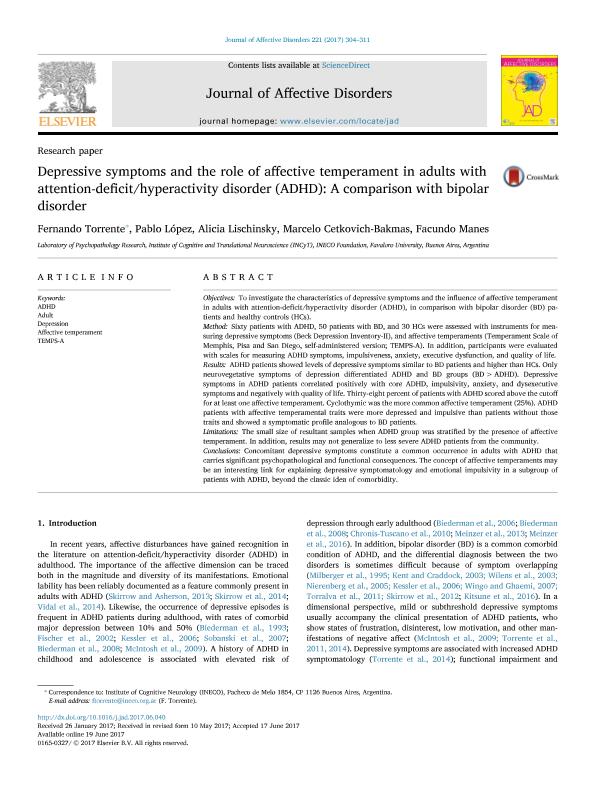Mostrar el registro sencillo del ítem
dc.contributor.author
Torrente, Fernando
dc.contributor.author
López, Pablo
dc.contributor.author
Lischinsky, Alicia
dc.contributor.author
Cetkovich Bakmas, Marcelo
dc.contributor.author
Manes, Facundo Francisco

dc.date.available
2018-06-13T21:14:55Z
dc.date.issued
2017-10
dc.identifier.citation
Torrente, Fernando; López, Pablo; Lischinsky, Alicia; Cetkovich Bakmas, Marcelo; Manes, Facundo Francisco; Depressive symptoms and the role of affective temperament in adults with attention-deficit/hyperactivity disorder (ADHD): A comparison with bipolar disorder; Elsevier Science; Journal of Affective Disorders; 221; 10-2017; 304-311
dc.identifier.issn
0165-0327
dc.identifier.uri
http://hdl.handle.net/11336/48588
dc.description.abstract
Objectives: To investigate the characteristics of depressive symptoms and the influence of affective temperament in adults with attention-deficit/hyperactivity disorder (ADHD), in comparison with bipolar disorder (BD) patients and healthy controls (HCs). Method: Sixty patients with ADHD, 50 patients with BD, and 30 HCs were assessed with instruments for measuring depressive symptoms (Beck Depression Inventory-II), and affective temperaments (Temperament Scale of Memphis, Pisa and San Diego, self-administered version; TEMPS-A). In addition, participants were evaluated with scales for measuring ADHD symptoms, impulsiveness, anxiety, executive dysfunction, and quality of life. Results: ADHD patients showed levels of depressive symptoms similar to BD patients and higher than HCs. Only neurovegetative symptoms of depression differentiated ADHD and BD groups (BD > ADHD). Depressive symptoms in ADHD patients correlated positively with core ADHD, impulsivity, anxiety, and dysexecutive symptoms and negatively with quality of life. Thirty-eight percent of patients with ADHD scored above the cutoff for at least one affective temperament. Cyclothymic was the more common affective temperament (25%). ADHD patients with affective temperamental traits were more depressed and impulsive than patients without those traits and showed a symptomatic profile analogous to BD patients. Limitations: The small size of resultant samples when ADHD group was stratified by the presence of affective temperament. In addition, results may not generalize to less severe ADHD patients from the community. Conclusions: Concomitant depressive symptoms constitute a common occurrence in adults with ADHD that carries significant psychopathological and functional consequences. The concept of affective temperaments may be an interesting link for explaining depressive symptomatology and emotional impulsivity in a subgroup of patients with ADHD, beyond the classic idea of comorbidity.
dc.format
application/pdf
dc.language.iso
eng
dc.publisher
Elsevier Science

dc.rights
info:eu-repo/semantics/openAccess
dc.rights.uri
https://creativecommons.org/licenses/by-nc-sa/2.5/ar/
dc.subject
Adhd
dc.subject
Adult
dc.subject
Depression
dc.subject
Affective Temperament
dc.subject
Temps-A
dc.subject.classification
Inmunología

dc.subject.classification
Medicina Básica

dc.subject.classification
CIENCIAS MÉDICAS Y DE LA SALUD

dc.title
Depressive symptoms and the role of affective temperament in adults with attention-deficit/hyperactivity disorder (ADHD): A comparison with bipolar disorder
dc.type
info:eu-repo/semantics/article
dc.type
info:ar-repo/semantics/artículo
dc.type
info:eu-repo/semantics/publishedVersion
dc.date.updated
2018-06-13T15:07:08Z
dc.journal.volume
221
dc.journal.pagination
304-311
dc.journal.pais
Países Bajos

dc.journal.ciudad
Amsterdam
dc.description.fil
Fil: Torrente, Fernando. Instituto de Neurología Cognitiva; Argentina. Universidad Favaloro; Argentina
dc.description.fil
Fil: López, Pablo. Instituto de Neurología Cognitiva; Argentina. Universidad Favaloro; Argentina
dc.description.fil
Fil: Lischinsky, Alicia. Instituto de Neurología Cognitiva; Argentina. Universidad Favaloro; Argentina
dc.description.fil
Fil: Cetkovich Bakmas, Marcelo. Instituto de Neurología Cognitiva; Argentina. Universidad Favaloro; Argentina
dc.description.fil
Fil: Manes, Facundo Francisco. Consejo Nacional de Investigaciones Científicas y Técnicas; Argentina. Instituto de Neurología Cognitiva; Argentina. Universidad Favaloro; Argentina
dc.journal.title
Journal of Affective Disorders

dc.relation.alternativeid
info:eu-repo/semantics/altIdentifier/url/https://www.sciencedirect.com/science/article/pii/S0165032717301696
dc.relation.alternativeid
info:eu-repo/semantics/altIdentifier/doi/https://dx.doi.org/10.1016/j.jad.2017.06.040
Archivos asociados
